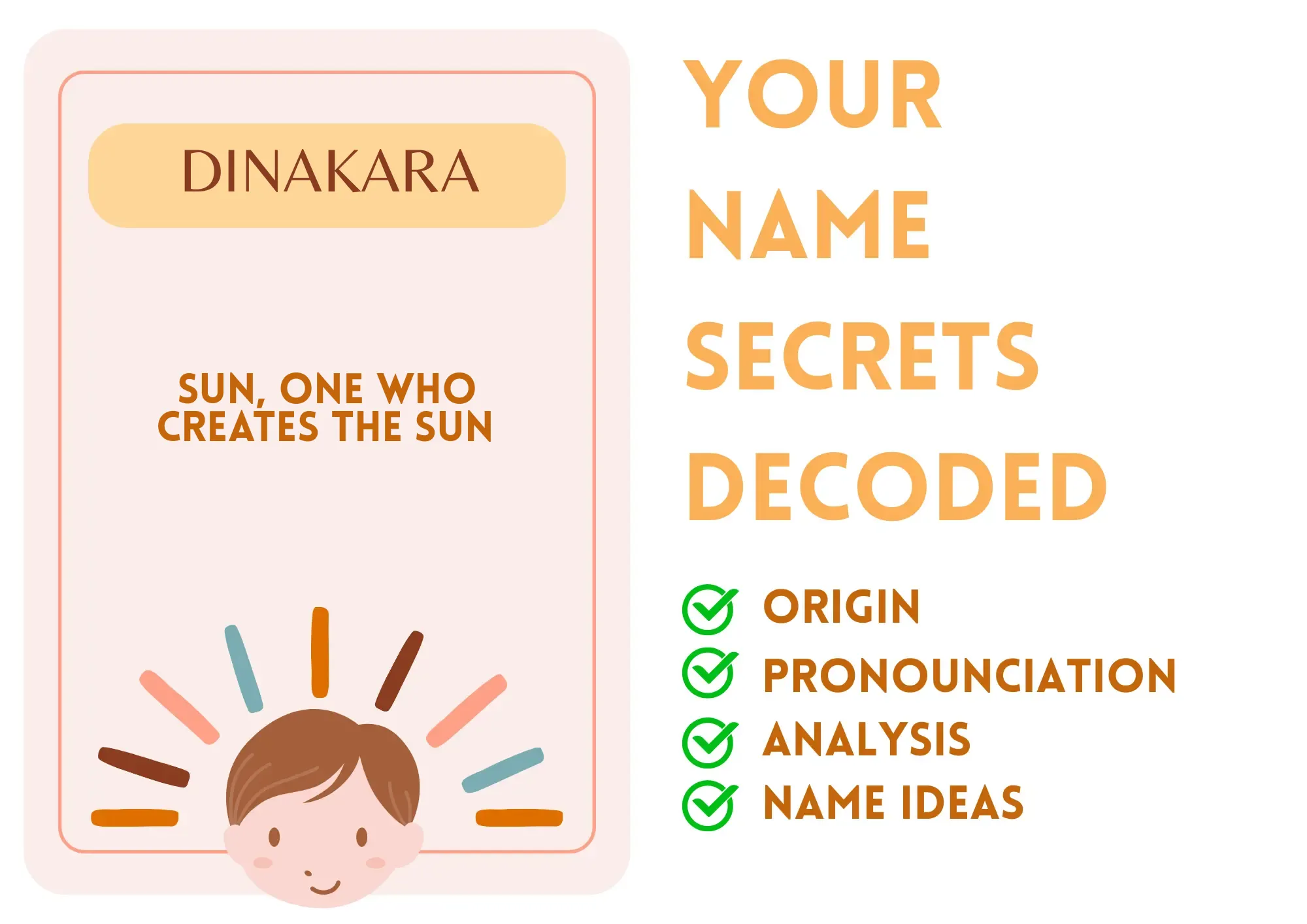
Dinakara
Dinakara is a name of Sanskrit origin, meaning 'sun' or 'one who creates the sun.' It symbolizes brightness, illumination, and vitality. Dinakara is predominantly used in India among Hindu communities, primarily as a masculine name. In Hindu culture, the sun is revered as a powerful symbol of life and energy, linked to various deities and considered essential for sustenance and growth.
The name is generally well-received, resonating a sense of warmth and positivity. It is regarded as a unique yet traditional choice. Dinakara is easy to pronounce and write, with potential nicknames such as Dinu and Kara.
Although not widely featured in contemporary pop culture, the name holds a storied significance in ancient texts and mythology, representing light and guidance. Parents often choose Dinakara for its deep cultural roots and the uplifting sentiment it conveys.
Basic Information
Gender: Boy
Sounds Like: DEE-nah-kah-rah
Pronunciation Explanation: The name has four syllables, with the emphasis on the first syllable 'DEE'. The other syllables are pronounced softly and smoothly.
Summary and Meaning
Meaning: sun, one who creates the sun
Origin: The name Dinakara has Indian origins, specifically in Sanskrit, linking it to Hindu traditions and beliefs.
Usage: Dinakara is traditionally a masculine name, firmly rooted in male associations.
Name Number (Chaldean)
Name Number (Pythagorean)
Name Constellation (Nakshatra)
Name Zodiac Sign (Rashi)
Popularity (Global Rank)
Overall: 108654
Boys: 41192
Most Popular in
Religious and Cultural Significance
Religion: Hindu
Background: In Hindu culture, Dinakara is associated with the sun god Surya, revered as the source of light and energy. This connection emphasizes strength, vitality, and auspiciousness.
Cultural Significance: The name Dinakara embodies cultural symbolism of the sun, often linked to themes of brilliance, growth, and sustenance, making it a thoughtful choice for new parents.
Historical Significance: Historically, Dinakara symbolizes the divine aspects of the sun in Hindu philosophy and literature, illustrating the sun's importance in agricultural societies and its role in mythology.
Popular Culture
Literature and Mythology: While Dinakara may not have widespread representations in modern literature, it can be found in ancient texts and mythological scriptures that discuss the sun and its deities.
Movies and Television: Dramatic portrayals of characters indirectly symbolizing qualities associated with Dinakara can be found in various Indian mythological series, highlighting the sun's significance.
Feelings and Perceptions
Perception: Dinakara is generally perceived positively, evoking associations with light, warmth, and positivity. It is seen as a powerful name, filled with cultural and spiritual resonance.
Positive Feelings: Strong, unique, bright, life-giving, optimistic, radiant.
Negative Feelings: May sound unfamiliar to those outside the culture; pronunciation could be mistakenly interpreted.
Practical Considerations
Ease of Writing and Calling: Dinakara is relatively straightforward to write and pronounce. Comprising eight letters, the syllable division makes it easy to remember and articulate.
Common Typos and Misspellings: Dinakara,Dinaakra,Dinkara,Dinacara
Common Nicknames: Dinu,Kara,Din
Dinakara Popularity
Dinakara Usage and Popularity By Country
| Country | Rank (Overall) |
|---|---|
| Oman | 12466 |
| Sri Lanka | 17967 |
| India | 23612 |
| United Arab Emirates | 67985 |
| Australia | 105589 |
| United States | 164599 |
| United Kingdom | 182431 |
Dinakara Usage and Popularity By City
| City | Rank (Overall) |
|---|---|
| Bengaluru | 10163 |
| Chennai | 11600 |
| Bombay | 18432 |
| Bangalore | 6160 |
| Dakshina Kannada | 1262 |
| Udupi | 1850 |
| Kanchipuram | 4791 |
| HyderÄbÄd | 30123 |
Compatibility Analysis
Famous Persons Named Dinakara
No results found for Dinakara.
Related Names
Similar Sounding Names:
Dhanakar,Diksha,Devendra,Dinesh

